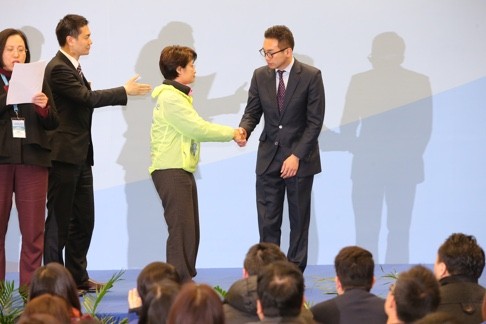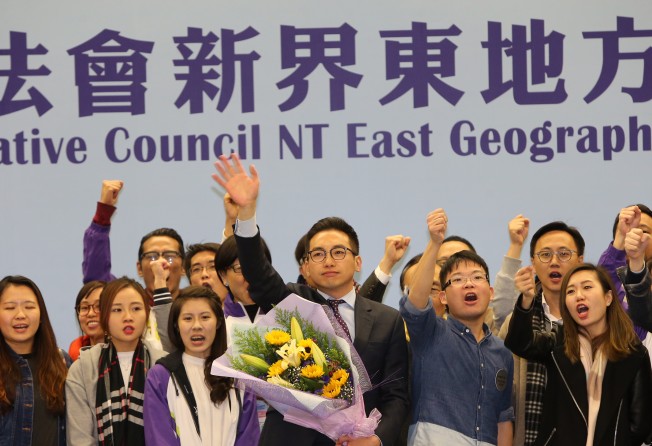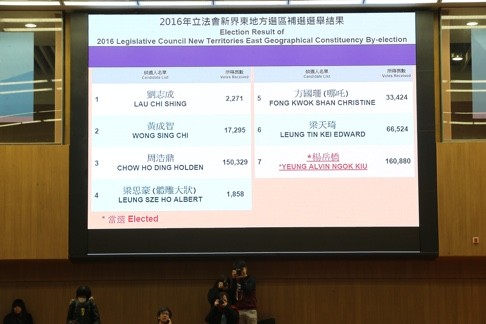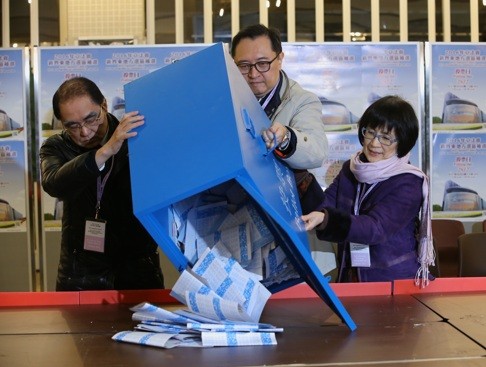
Pro-democracy candidate Alvin Yeung wins hotly contested Hong Kong by-election, while localist Edward Leung has credible showing with 15pc of vote
Civic Party barrister defeats arch-rival Holden Chow in New Territories East to deny pro-establishment camp control of both halves of chamber

Civic Party barrister and pan-democrat Alvin Yeung Ngok-kiu has won the hotly fought Legislative Council New Territories East by-election to retain the seat left vacant by Ronny Tong Ka-wah, who quit the party and the legislature last year.
Out of some 434,000 ballots, Yeung won 160,880 votes. His arch-rival, Holden Chow Ho-ding from the Beijing-loyalist Democratic Alliance for the Betterment and Progress of Hong Kong, got 150,329 votes. Localist candidate Edward Leung Tin-kei, from Hong Kong Indigenous, received 66,524 votes.
Yeung said: “I am very lucky and grateful to have won this election, and [to have run against] Edward Leung, who is an opponent I respect.”
“I think this election reflected that the people wanted the pan-democrats, the Civic Party and the legislature to reform. I also understand that some people voted for me not because they completely agreed with what the party and I did, but because they don’t want the seat to go into the hands of the pro-establishment camp. I will reflect on what I haven’t done well enough,” he added.

Hong Kong Indigenous candidate Leung said that although he was not satisfied with the 66,000 votes he got, he believed the result was a warning to the government that “the people are not afraid of it, but instead it should fear the people”.
“The localists will get ready for the September election, and I think from then on, the three blocs – pan-democrats, localists and pro-establishment – should stand neck to neck,” Leung added.
“It’s difficult for us to coordinate with the pan-democrats because we have different beliefs, visions and means of struggle,” he said.
DAB’s Chow was also dissatisfied that he lost the race.
He said: “I could have done better, I was not well-known enough, and I started my campaign quite late … But I still firmly believe that Hong Kong should be taken back on the right track, and that the residents support a peaceful, law-abiding and rational Hong Kong.”
Leung dropped a strong hint that he might run in New Territories East again in September, but Chow and independent candidate Christine Fong Kwok-shan declined to say if they would do the same.
Sai Kung district councillor Fong said she was disappointed that the election had “become a tussle based on political views rather than a race determined by candidates’ work in the constituency”.
Fong, who received 33,424 votes, said society was just continuing to “step on the spot”, and that the by-election “did not help to resolve Hong Kong’s deadlock”.
Watch: Localist candidate Edward Leung Tin-kei attempts to become Hong Kong’s youngest lawmaker
Nelson Wong Sing-chi of Third Side, a former Democratic Party member, received 17,295 votes. He said he lost because his campaign was not good enough.
“If voters had a better understanding of our stance on seeking a middle way in politics, I think I could have got more ballots,” Wong said.
He declined to say if he would run again in September.
Independent Lau Chi-shing and barrister Albert Leung Sze-ho had 2,271 and 1,858 votes, respectively.
More than 430,000 voters turned out – or 46.1 per cent of the eligible electorate. The poll is seen as a critical test for Hong Kong’s tinderbox political situation following the Mong Kok riot earlier this month.
The rate was lower than the turnout of 53.9 per cent in the same constituency in the 2012 general election.
The by-election was held to fill the seat of former Civic Party member Ronny Tong, who quit after the failed electoral reform last June. Tong said he did not vote for Yeung, adding that he shared political views with Wong.
It is widely seen as a litmus test of public support for localist candidate Leung, an advocate of radical protests to pursue independence for the city.

Clashes broke out during campaigning on Sunday night. At about 7pm, a 30-minute scuffle between pedestrians and Yeung’s supporters outside Tai Wai MTR station prompted police to threaten to use pepper spray at least twice as a warning.
Some onlookers complained that they were beaten without reason during the chaos.
Another incident happened in Sheung Shui MTR station at about 9.15pm. About 20 supporters of Yeung and Leung were involved in a clash. At least one helper from Leung’s camp was reportedly hit and sustained a wound to his eye. Officers stepped in and separated the two parties.

Electoral Affairs Commission chairman Mr Justice Barnabas Fung Wah said he noted that police had been handling some assault cases.
“I would emphasise that the election culture in Hong Kong has been non-violent. And police are investigating individual cases. It will be up to them to handle the cases,” he said.
Fung also revealed that there had been 339 complaints about the by-election, with a majority about the placing of election advertisements and nuisance from canvassing. He said most cases had been resolved immediately on site.
Brian Fong Chi-hang, associate director of the Academy of Hong Kong Studies at the Institute of Education, earlier said it would be a serious wake-up call for Beijing if the candidate from Hong Kong Indigenous clinched more than 15 per cent of total votes cast.
“In that scenario, radical protest methods and the call for Hong Kong independence would no longer remain a force representing only a minority voice in the city,” Fong said.
Leung’s final share of the votes was slightly more than 15 per cent
At stake also was the possibility of an amendment to Legco’s internal rules if Chow, the candidate from the Democratic Alliance for the Betterment and Progress of Hong Kong, had won.
A Chow victory would have given the pro-establishment camp control of more than half of Legco’s 35 geographical constituency seats.
They already have the majority in the other half – the functional constituencies. By controlling both halves of the chamber, the pro-establishment camp could push through procedural changes to curb prolonged filibustering that has stalled Legco business.
Chinese University political analyst Ivan Choy Chi-keung said it was normal for by-elections to have a lower turnout rate than full citywide elections. The constituency has been a stronghold of the pan-democrats, who won over 56 per cent of the votes in 2012.
Source: Registration and Electoral Office
Yeung saw his lead over Chow narrowing in the wake of the violence in Mong Kok and Leung’s growing prominence. He said in Fanling yesterday: “Most cast-iron votes are pro-establishment, so a low voter turnout rate is usually not a good sign for the pan-democrats.”
Clerk Molly Lau said she had voted for Yeung because she did not want Hong Kong to become like the mainland. But she would not support Leung as she was opposed to violence.
Another clerk, Peter Wong, 24, who did vote for Leung, cited a generation gap at play. “[The older generations] have become unrealistic, while the younger ones can’t even make a living,” he said.
Chan Kai, a retired civil servant, said he voted for a pro-establishment candidate.
“I want Hong Kong to be more peaceful,” he said, noting that the Mong Kok riot and filibustering influenced the way he cast his ballot.
“Some of my friends who work in retail were affected by the chaos.” he said.
“And filibustering has really made the city lag behind other advanced places,” he added.
Additional reporting by Chris Lau, Owen Fung, Melanie Leung, Shirley Zhao, Allen Au-yeung
